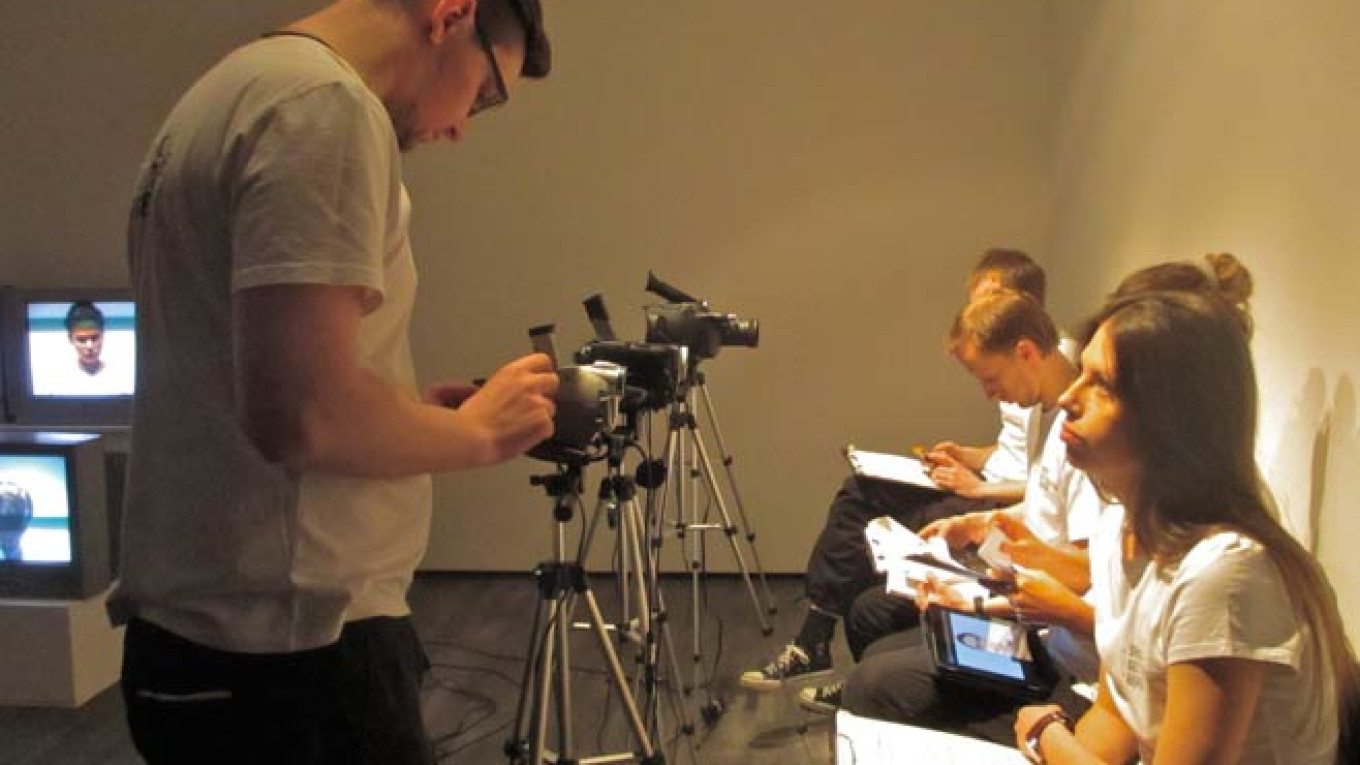The Golden Mask Festival is a boon for us sit-at-homes. You can't travel to Kazan or Ryazan to see the latest work from those cities? The Golden Mask brings them to you.
Volkostrelov is an artist with great instincts and a flair for the unusual.
As ashamed as it makes me, I, for example, rarely even get to St. Petersburg. And great things happen there. For me the Golden Mask offerings of St. Petersburg productions are of special interest.
For the second year running, one of the most intriguing of the festival's shows was a piece originally created, in part, by Dmitry Volkostrelov in St. Petersburg. Last year it was Pavel Pryazhko's "Angry Girl," produced jointly by the Bryantsev Young Spectator Theater and Volkostrelov's Post Theater. This time around it was a bracing rendition of Mark Ravenhill's "Shoot/Get Treasure/Repeat" by Volkostrelov, Semyon Alexandrovsky and Alexander Vartanov that made me walk away shaking my head in admiration.
If you missed the Golden Mask performances, you are in luck. The show will continue to play in St. Petersburg where you may be able to catch it on your next trip there. You will need four to six hours to do it, but it will be four to six of the most unusual hours you ever spent in a theater.
You see, right there I have to backtrack. "Shoot/Get Treasure/Repeat," produced by Post Theater, does not take place in a theater and, properly speaking, it is only partly theater. It is also film, literature, radio, gallery installation and museum exhibit. In Moscow it played at the Moscow Museum of Contemporary Art on Gogolevsky Bulvar. In St. Petersburg it may move to the Erarta Gallery on Vasilyevsky Island.
Ravenhill's composition consists of 16 short plays inspired by some of the key myths and plots of Western civilization. They include D.W. Griffith's film, "Birth of a Nation;" Homer's "The Odyssey;" D.H. Lawrence's novel "Women in Love;" H.G. Wells' novel "The War of Worlds" and Orson Welles' famous radio spoof of it. Each runs about 20 minutes and plays at various times in different halls. Spectators are free to wander about, watching performances in any order they choose, or taking time to catch a breather on the street before heading back in to join the intersecting flows of spectators.
All segments raise hard questions about topics that some societies have taken for granted for centuries, and other societies are grappling with in new ways even as we speak. Such words as "democracy" and "freedom" are tossed about like balloons in a hurricane, sometimes losing their meaning whatsoever, and, on occasion, acquiring meanings we might not expect.
In "The Odyssey" eight actors, split into two groups, sit on opposite sides of a room. Cameras project their faces onto eight monitors facing the spectators. Their impassioned discussions of defending, preparing to defend, and being prepared to defend democracy take on the manic quality of demagoguery as they occasionally descend into irate shouting matches of "Scum!" and "Punish!"
Personal fears and dangers arise in "Fear and Misery," wherein a young husband and wife sit silently at a table eating while the text of their conversation scrolls up the wall behind them.
There is in "Shoot/Get Treasure" virtually none of the acting we tend to associate with theater. Performers are removed from the text through video feeds or silence, or even through complete detachment. In the segment called "Mother" an actress playing a woman who fears two soldiers have come to say her son is dead, stands impassively and watches spectators as they listen to a text delivered via headphones.
One of the most powerful pieces is "Paradise Lost," a film by Alexander Vartanov. In it a woman irritated by moaning sounds emanating from a neighboring apartment comes to complain. In a few moments she traverses the territory from irritation and anger, to sympathy when she suspects her neighbor is being tortured, to near violence when she comes to believe her neighbor is a terrorist.
Like "Shoot/Get Treasure/Repeat" as a whole, it is a harrowing and convincing portrait of the confused times we live in.
The Golden Mask Festival concludes Thursday with performances of the Alexandrinsky Theater's "Liturgy/Zero" at the Moscow Art Theater, and the Pokrovsky Chamber Musical Theater's "Khostomer" on its home stage. Ticket information: 495-507-3553. Information about "Shoot/Get Treasure/Repeat" is available at teatrpost.ru.
Contact the author at jfreedman@imedia.ru


